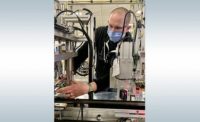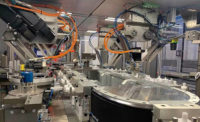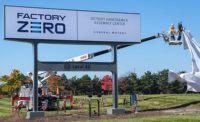1 // Automated System Installs Electric Vehicle Power Trains
Nissan has invested $305 million in its factory in Tochigi, Japan, to develop new technologies for assembling electric vehicles.
One of the first advancements to come from that investment is a new “universal power train mounting system.” Mounting power trains is a strenuous and time-consuming process for assemblers, who must install multiple components in sequence. Nissan’s new system uses an automated pallet to mount the entire power train at once. During mounting, the system measures the car’s dimensions in real time, and the pallet makes micro-adjustments accordingly. It installs power trains with submillimeter accuracy.
The system can mount three types of power trains (gas engine, hybrid electric and pure electric) and accommodate 27 module combinations.
2 // Honda Researching How to Reuse EV Batteries
Honda is teaming up with Ohio-based American Electric Power (AEP) to develop a network of used electric vehicle batteries that could be integrated into the utility’s electrical grid. The project seeks to address challenges related to the expanding use of EVs. For example, the increasing volume of EVs has the potential to strain the power grid, including spikes in demand during early evening hours when drivers plug in their EVs after work. Storing additional power in used EV batteries could help utilities meet that demand with renewable energy resources.
3 // Ford Sells Out of Electric Mustang
Ford has filled all advance orders for the First Edition Mustang Mach-E, its first long-range battery-electric vehicle. While Ford has not said what that translates into in raw numbers, analysts believe the initial run will total some 10,000 cars.
4 // Audi Uses VR to Design EV Assembly Line
Audi engineers are using virtual reality (VR) technology to design the assembly line for the new e-tron GT electric car, which will be located at the company’s factory in Neckarsulm, Germany. The technology will allow engineers to evaluate setups without having to create physical prototypes. For Audi, it’s the first time that workflows have been tested entirely virtually. Using VR glasses, workers and managers from logistics, assembly and quality virtually perform various processes for assembling the car.
5 // $11.4 billion
BMW has signed an $8.2 billion contract to purchase battery cells from Contemporary Amperex Technology Co. Ltd. The automaker has also a $3.2 billion contract to buy battery cells from Samsung SDI. Both contracts will run through 2031. By 2023, BMW expects to have 25 electrified models in its lineup, more than half of which will be fully electric.







